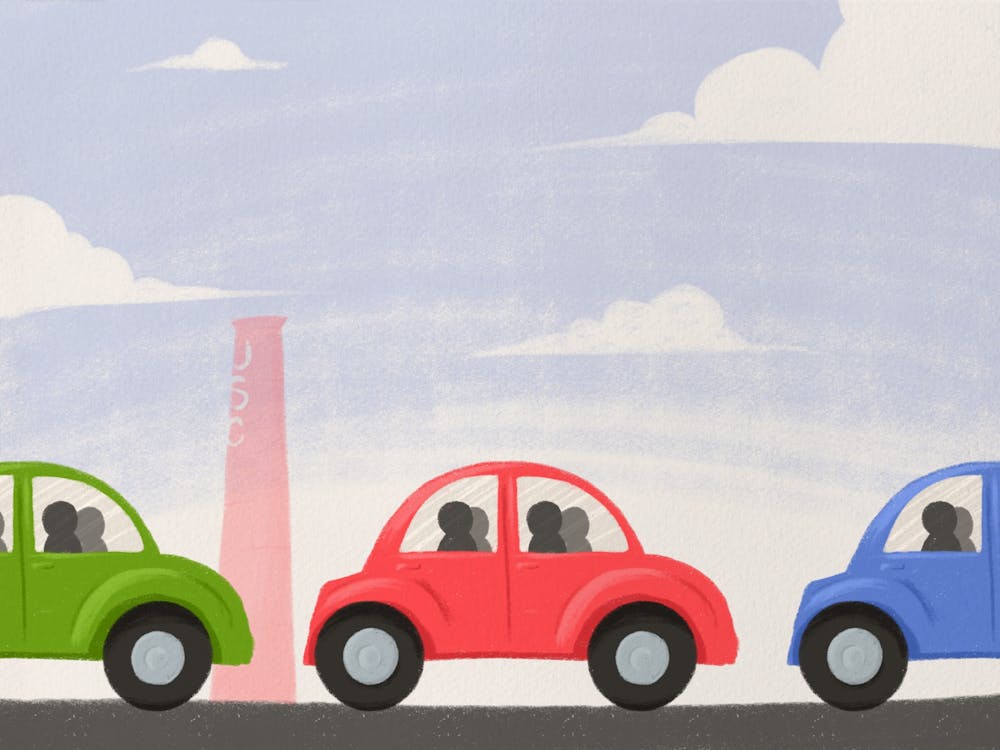For many USC students, the school day starts on the road. They pull out of driveways and parking lots, then traverse Richland County's highways to attend their literature surveys and late-night labs. There can be obstacles along the way: parking shortages, rush-hour traffic, mechanical failures. But it is all part of the routines of USC's student commuters.
Student commuters make up a significant portion of USC's student body, a trend that is largely caused by the popularity of off-campus housing. Usually, moving off-campus requires students to commute to their classes, either by car or by bus. Driving to campus can greatly impact commuters' college lives, especially when students' homes are far away from the university. Still, choosing to commute does allow students some financial and personal freedom.
Laukhika Kasetty, president of the Carolina Commuters Club, and Vedi Ganguru, vice president of the CCC, commute to USC from Lexington, which is 40 minutes away from campus. For Kasetty, driving to her classes makes more financial sense than paying for USC's notoriously expensive on-campus dormitories.
"[Commuting] gave my family a little bit more financial freedom and me to be able to do other things or invest my money in other things that I found more useful," Kasetty commented.
Driving to campus is also a more sensible option for students whose families live in Richland County, as doing so helps students maintain close connections with their relatives. Ganguru mentioned how commuting helped her stay in touch with her family.
"My dad recently got remarried, so I wanted to spend more time with my stepmom and I knew if I could stay at home, I could get to know her," Ganguru said.
In order to reap these benefits, student commuters must develop good time management skills. Drive times can vary greatly depending on traffic conditions, so drivers must plan ahead. For this reason, Ganguru recommends that students start their commutes early in the day. Having spare time in one's schedule can offset the time lost in a traffic jam, thus mitigating the risk of being late to class.
Another consideration for student commuters is downtown parking. To obtain on-campus parking, student drivers must purchase permits from the university that allow them to park their cars in designated lots. However, these permits can be very expensive depending on where one decides to park. Commuting Undergraduate permits, the cheapest option for undergrads, cost around $125 annually and allow for students to park in "Any Decal" lots, which are usually located farther from campus. If students wish to park closer to campus, they must purchase a Garage/Reserved Permit, which costs $880 annually and allows access to on-campus garages. Permits are a major investment, and drivers should be mindful of how their permit fits into their budget.
Furthermore, drivers must pay attention to the locations and car capacities of the lots they use. Many of these lots can become crowded during class hours, and since the center of campus has a limited number of garages, drivers often have to park at places farther away from classroom buildings. Even though finding available parking sounds like a difficult task, Kasetty believes drivers can get better at it over time.
"If you get a groove of where campus is and what places you can park at, it's not the worst thing you can deal with," Kasetty said.
But, according to Ganguru and Kasetty, the practical challenges of commuting are not the most pressing ones. Socializing can be incredibly difficult for commuters, in large part due to the limited amount of time they spend on campus. Compared to on-campus students, commuters have fewer opportunities for conversing with classmates and attending university events, often because parties, interest meetings, workshops and study sessions occur at night, the time when many drivers return to their homes. As such, commuters can have difficulties with making connections with their peers.
Ganguru discussed how driving to class during her first year was initially a difficult experience, both practically and socially. Her home was a fairly large distance away from campus, so she had to efficiently budget her time, which was a difficult task considering she was still acclimating to college life. While this budgeting was challenging, Ganguru believes it improved her time management skills.
"I do think [commuting has] made me become better at planning and time manage myself more in that way," Ganguru said.
Additionally, Ganguru ran into some difficulties with socializing in the first weeks of the semester. Lots of interaction among first-years occurs in dormitories, where the close proximity between students and the frequency of hall events incentivize student bonding. Since Ganguru lived off-campus, she was not able to participate in dormitory social life, making socialization a much harder task. Instead of through dormitories, Ganguru found her friend group through a different means: student organizations.
"I found myself having to stay after classes and joining student organizations a bit more to find that community, in the sense of the group of friends I got freshman year," Ganguru said.
Now, Ganguru and Kasetty are the leaders of the Carolina Commuters Club, an organization that helps commuters find their friend groups and connect to the USC community. Socializing is a large focus of the club, and members can interact with each other during CCC meetings. Ganguru hopes that these interactions will lead to future friendships between commuters.
"If they find someone who's their same major or get to know someone in their club they relate to, I think it's a great way to potentially make friends. Not just being in a club, but also getting to know someone outside of the club and having that mentorship and support," Ganguru said.
In addition, the CCC hosts events that expose members to the extracurricular activities offered by USC, all in the hopes that commuters will feel more familiarized with their university.
Kasetty talked about how a recent Group X class hosted by the CCC introduced many of its members to the Outdoor Recreation Office and the activities it offers.
"We just try to interact our members with different resources on campus so that they feel a lot more familiar with campus," Kasetty said.
While living away from the university can seem daunting, the connection between students and campus is more social than spatial. Through communities like the CCC, students that commute can form these social connections and enjoy their college experiences as much as on-campus students. Opportunities for career development, creative expression and socialization are available to everyone in USC's student body, no matter how they get to campus. Whether by foot or by car, all college students can have access to the fun of university life.
To demonstrate how commuters can have an active college life, Kasetty referenced her and Ganguru's college accomplishments.
"Me and Vedi, even as commuters, we were able to start a club. We're both involved in research," Kasetty said. "Saying all of this, no one should be scared to commute to campus."



